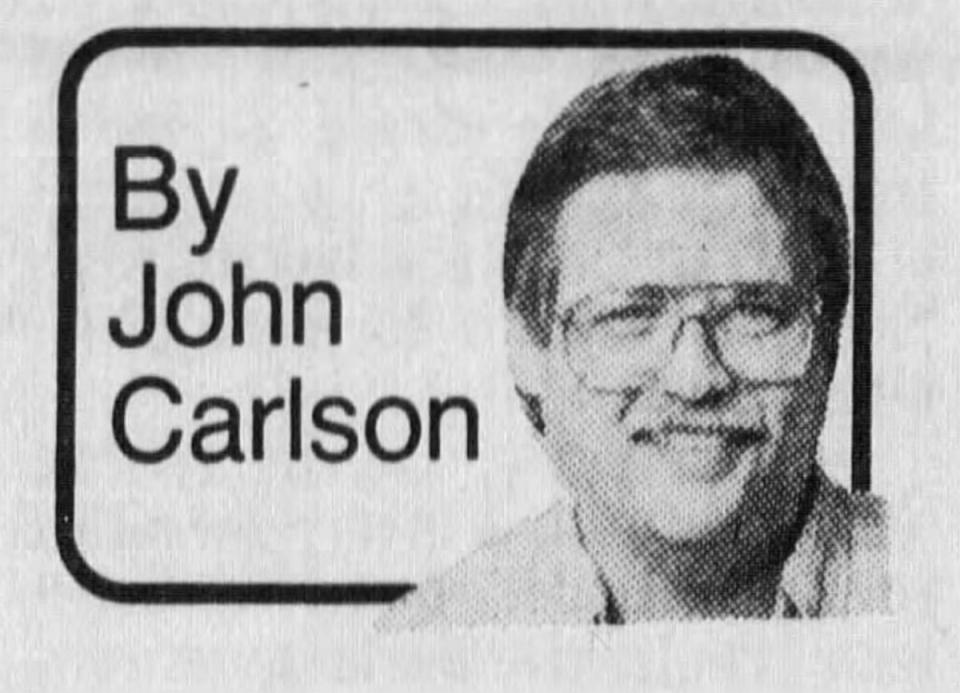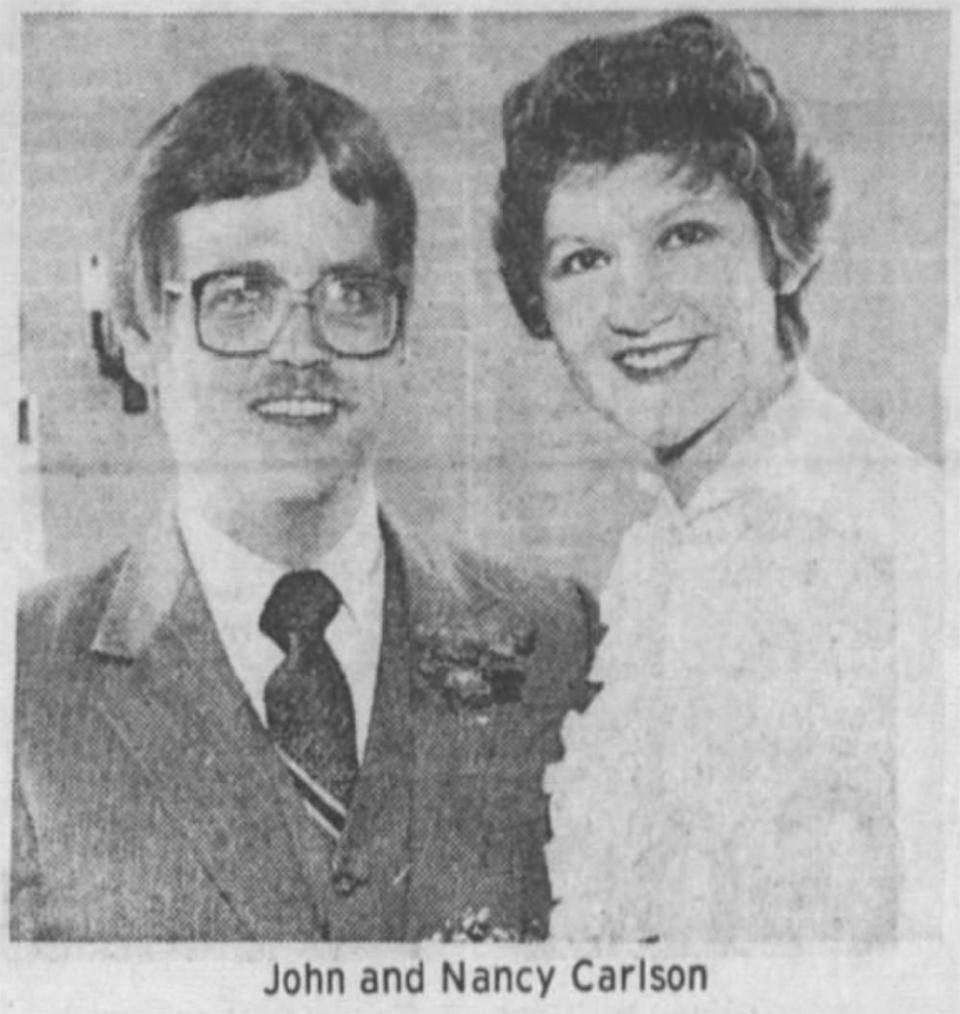Bygone Muncie: Journalist John Carlson was an antidote for a dark age
If it wasn’t for the celibacy, I think being a medieval monk would be the best job in the world. As a devout introvert, I find myself daydreaming often about a secluded life of reading and writing. For the contemplative, gothic monasticism offered a lasting reprieve from the dirty business of social interaction. Some monks carved out huge blocks of time for meditative prayer, scholarly output and, on occasion, even the fermentation of beer. Orders first appeared in North Africa and Western Europe during the Middle Ages. They varied in practice, but some dedicated themselves to the conservation and duplication of ancient texts. Much of early Western Civilization passed through the quills of monks as they labored away for centuries in dank scriptoria.
More Bygone Muncie: 1932 Fourth of July celebration included speeches, baseball, epic fireworks
Such orders worked mostly with religious texts in the Early Middle Ages, but during the Carolingian Renaissance of the 8th and 9th centuries, scribes copied and preserved thousands of documents of Western literature, including many non-religious works from antiquity. Such efforts helped Europeans claw out from the dark age that had evolved after the collapse of the Western Roman Empire.
Today, secular scholasticism fulfills much the same role as medieval monasticism. Yet the work remains basically the same: long hours hunched over old documents, copying and interpreting source material and repackaging it for modern readers. For local historians, such "old documents" come in many forms, but the best are found in archived newspapers.
For 185 years, Muncie's papers have provided an account of daily life in our community, covering the stories that define us and laying down the introductory draft of local recorded history. Muncie’s first newspaper was published as the Muncietonian by David Gharkey in 1837. In decades that followed, Munsonians launched dozens of newspapers, including Morning Star in 1899 and Evening Press in 1905. These two merged in 1996 to become The Star Press.
My news junkie parents subscribed to both papers in the 1980s and 1990s. By high school, I had become a fan of the late John Carlson, the prolific author and reporter who spent almost four decades of his life writing for the Evening Press and later, The Star Press. Carlson’s first article was published on Sept. 20, 1975, with the title, “The Well-Traveled Orens are Helping All Ages.” The story was about Ruth and Roger Oren, two Muncie teachers who shared stories and photos from their international travels through the Retired Seniors Volunteer Program. Carlson concluded that the “Orens are examples of the vital and vigorous people who are making RSVP a success.”

For the next 39 years, Carlson wrote thousands of articles for the paper. His work covered everything from city court beat reporting, to elections, food and movie reviews, hard news, biopics, humor columns and features. A Newspapers.com search returned 4,597 results with the byline “By John Carlson,” an average of 117 articles each year he worked for the paper. This accounting doesn’t even include his books, Muncie Journal essays, or short stories. It would take a medieval monk a lifetime of uninterrupted cloistered study to read through and understand all of John’s published work.
More: Remembering Star Press journalist John Carlson by rereading his words
But it’s not the breadth of his oeuvre that Carlson is most known for, it was his humor. Levity was a characteristic of his writing from the get go, evidenced by wonderfully titled articles like, “Dangerous Weapon? Only Mouth, Man Says” and “Police on Wild Peacock Chase,” both in 1976. Around this same time, Carlson wrote a series about local pilots and humorously credited himself as the “Evening Press Aviation Writer.”

By the late 1980s, he was writing features almost exclusively, bringing his jocularity to the forefront with gems such as, “Snakes: I Don’t Like Them, I Don’t Trust Them and I Do NOT Want to See Them” and, “New Library Status is the Best Deal Going for Uncarded Masses.” A year later he penned the clever, “They Were Reaching For Culinary Heights, But Hit Wok Bottom.” In addition to his hysterical musings, Carlson’s delightful local stories provide snapshots of Muncie life and, in retrospect, a biographical history of everyday Munsonians.
I never asked John if he saw himself as a purveyor of history. Most reporters that I’ve posed the question to don’t, countering that they write about the present for readers in the here and now. But the longer I write this column the more I understand just how indispensable journalists are for the local historical record. An American city without a newspaper is simply one without a history. Whether they are conscious of it or not, reporters write for posterity as much as they do for contemporary readers.

John Carlson was no exception. For instance in fall of 1979, he covered the Muncie mayoral race between Alan Wilson and James Carey. Carlson and his colleagues’ reporting of the candidates and the election’s ultimate outcome provides in the historical record a clear account of the pivotal ‘79 election. Wilson crushed Carey by 20%, some 4,666 votes. The race later became known nationally in an episode of the 1982 “Middletown” PBS documentary series.
Carlson published his last piece for The Star Press on Dec. 5, 2014. Like his first story for the paper, the article was about a magnanimous couple; this time Bob and Stacy Ball, the founders of Blood N' Fire Ministry. The Balls were the winners of the Star Press "Person of the Year" contest and Carlson did the write-up. He found the couple to "have left their footprints all over this community, and it's decidedly better off for it." A true statement about Stacy and Bob for sure, but also one that encapsulates John Carlson’s own career in the Magic City.
Take my opinion for what it’s worth, but I’m convinced we’re already on a long slide down into another dark age. We’ve demonstrated vast incompetence in meeting every challenge so far of the 21st century. Americans don’t agree on a common good, which isn’t a new phenomenon, but our radical polarization undermines the cooperative spirit we desperately need right now. Unenlightened vanguards have distorted and politicized all things, agitating an already spiteful, fragmented people. Shallow careerists debase our institutions while national politics devolve into hyper-partisan incompetence. Mindless consumerism cheapens every aspect of life as we trash the atmosphere with reckless abandon. I have no idea what Americans even value anymore except social status, violence, navel gazing and Marvel movies. It’s all a recipe for decline and I think we’re doomed.
But I take solace in the hope that in some distant age, a new monastic tradition may uncover, copy and interpret the great works of our time. Perhaps local monks, laboring away in some tumble-down future monastery along the banks of the White River, may even discover the works of John Carlson, the great Munsonian writer of the late 20th and early 21st centuries. They will surely see what we saw in him, a master storyteller with a kind soul and a penchant for humor. Who knows, maybe his work will even inspire a Carlsonian Renaissance in a better world yet to come.
Rest in peace my friend, you are missed and forever loved.
Chris Flook is a board member for the Delaware County Historical Society and is the author of "Lost Towns of Delaware County, Indiana" and "Native Americans of East-Central Indiana." For more information about the Delaware County Historical Society, visit delawarecountyhistory.org.
This article originally appeared on Muncie Star Press: Bygone Muncie: Journalist John Carlson was an antidote for a dark age

